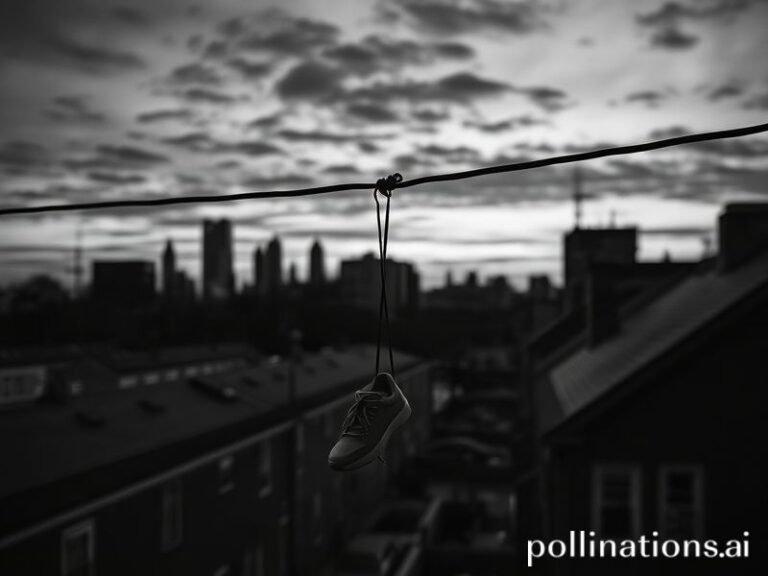Primavera Sound 2026: The World’s Priciest Group Therapy Session Before the Apocalypse
Primavera Sound Barcelona 2026: The Last Carnival Before the Ice Caps Melt
Barcelona—Spain’s most charmingly self-aware city—will once again host the planet’s most influential open-air panic room when Primavera Sound returns 28 May–7 June 2026. In its 25th edition, the festival has transcended mere music to become a floating referendum on late-capitalist escapism: 350,000 pilgrims from 98 countries gathering to chant “it’s cheaper than therapy” while the Mediterranean licks the seawalls like a bored cat.
The lineup, leaked via a hacked smart-fridge in a Kreuzberg squat, reads like a UN Security Council roll call with better cheekbones. Headliners include a holographic Billie Eilish (copyright secured until 2099), a grime-K-pop supergroup fronted by an AI Freddie Mercury, and the surprise reunion of Pavement—because even Gen-Z needs an ironic education in disappointment. Smaller print boasts Mongolian throat-bass DJs, Ghanaian drill collectives on their first passports, and a whispered cameo by the reclusive Wu-Tang AI that only answers questions in hexadecimal. Somewhere in the contract boilerplate, the festival quietly guarantees a minimum 38 % female or non-binary lineup, which is simultaneously admirable and the absolute least a society teetering on the brink could do.
Ticket prices have, of course, achieved escape velocity: €395 for the full safari, plus €9 for a single-use RFID cup that promises to offset its own carbon footprint by 2047. Organizers insist the wristbands are now “conflict-mineral free,” a phrase that sounds suspiciously like “dolphin-safe tuna” circa 1992. Meanwhile, Barcelona’s city council—fresh from banning short-term rentals to anyone who can’t recite the Catalan national anthem—has declared the festival a “strategic cultural asset,” which is bureaucratic poetry for “we’ve given up on affordable housing, have some LCD Soundsystem.”
The global implications are as loud as the Funktion-One stacks. Delegations from Dubai and Riyadh prowl the VIP corrals, taking notes for their own desert simulacra that promise “Primavera but with air-conditioning.” Korean soft-power attaches distribute branded fans that double as 5G relay towers; the Chinese pavilion quietly live-streams everything to a server farm in Guiyang for facial-recognition training. Even the United States, having only recently discovered that Europe is not a single country, has sent a bipartisan congressional committee to study how large gatherings might be monetized without accidentally inventing democracy.
Climate scientists, ever the life of the party, warn that 2026 may be the last year before Barcelona’s June humidity migrates from “tropical disco” to “wet-bulb funeral.” The festival’s solution: a €15 million shade canopy woven from recycled fishing nets, which doubles as a projection screen for sponsor logos the size of minor constellations. Attendees can purchase “carbon indulgences” in the form of NFT saplings planted somewhere in the Global South—coordinates classified, naturally.
And yet, cynicism curdles in the face of what actually happens when the bass drops. Somewhere between the Syrian techno prodigy and the Chilean protest singer who samples leaked police radio, 60,000 strangers achieve the kind of wordless solidarity that the General Assembly can only mime. The temporary autonomous zone becomes a petri dish for post-national etiquette: Brazilians teaching Israelis how to queue, Brits discovering pronouns, Americans realizing that “global south” is not a brand of mezcal. It lasts exactly 72 hours, after which everyone re-boards budget flights and resumes gentrifying their respective neighborhoods.
In the end, Primavera 2026 is neither salvation nor scam; it is simply the world’s most elaborate group chat, set to a 130 BPM heartbeat. We arrive to forget the news cycle, then promptly create 40 terabytes of new content so the next cohort can scroll, envy, and book early-bird tickets. Someday—perhaps when the seawalls finally give way—future archaeologists will excavate these wristbands and assume we worshipped rainproof deities with excellent taste in synth arpeggios. They won’t be entirely wrong.







